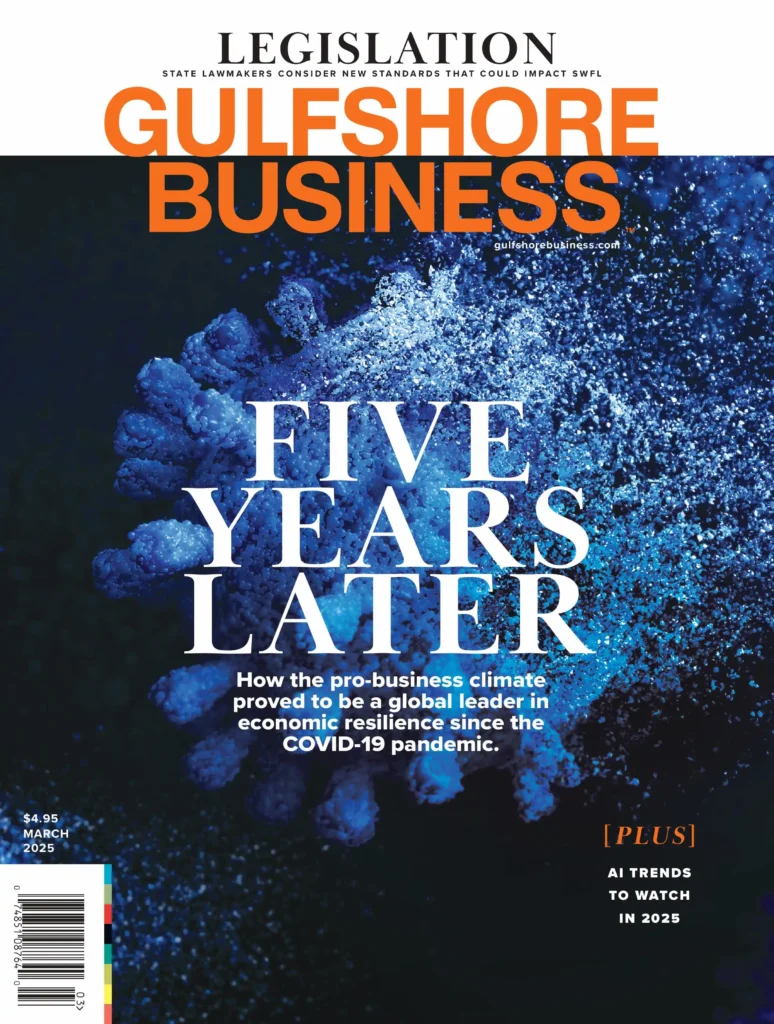Southwest Florida has a lot to recommend it. It’s a fantastic place to visit—balmy breezes, sugar-sand beaches, outdoor activities and nature—which is why nearly 3 million people visited Collier County last year. It’s also a tempting place to live, as is evident from the region’s population growth since 2020. It’s even an excellent place to run a business; and this month we’re particularly pleased to honor 10 exemplars of their respective industries as our 2024 Women in Business, beginning on p. 50.
This is our third year to recognize a set of dedicated achievers, many of whom juggle everyday work-related stressors and familial responsibilities, while also making time to elevate and enrich the fabric of our community. It’s no simple feat, and we want each woman in business to receive the recognition she deserves; special kudos to this year’s honorees for their tireless efforts to succeed in business and life while improving the area for all of us.
But Southwest Florida isn’t automatically a paradise for everyone. Ask the homeowner whose life was uprooted by Hurricane Ian, or the lifelong resident who can no longer afford to live in his old neighborhood, or the retiree who is suddenly thousands of miles away from her family and friends, or the new resident who’s beginning to realize that sunshine by itself may not be a cure for depression.
May is Mental Health Awareness Month. A mental health condition can be truly debilitating, and it’s important to realize just how prevalent the problem is in America, even here in sunny, wealthy Southwest Florida. The neighbor next door, the friend from church, the caregiver for a loved one … even a coworker or your boss. The odds are very strong that we live with, work with or know well someone afflicted with a mental health condition—and for many of us the “someone” is ourselves, suffering quietly and internally.
If there’s one constant in life, it’s change. Life happens. Situations happen. Seismic events happen. One lingering illness or injury, one sudden shock, one painful loss might be the metaphorical pebble that triggers an emotional avalanche.
For example, Hurricane Ian took a mental toll on the residents of Southwest Florida, and we’re still reeling in the aftermath, having experienced en masse the kind of traumatic stress that can develop into PTSD. Life goes on, sure, but even as the memories begin to fade, that doesn’t mean the aftereffects magically disappear.
Acknowledging and seeking ways to alleviate the problem is the focus of “Mental Health Matters” on p. 32. It’s a weighty topic. I hope reading this feature gives you some perspective on the breadth of these issues and the importance for all of us, whatever our mental states, to recognize that denying problems and perpetuating stigma are not solutions. Needing help with processing and responding to mental challenges is not a weakness, and recognizing and acting on that need is a strength all its own. I want to encourage you to seek and use the resources available to us locally. I think we all need to know that after a pandemic, a hurricane, loss of any kind, it’s OK to admit that we’re not OK—and that whatever we’re going through, it doesn’t have to be hopeless. Professionals with the tools to help people get back on track are right here. Talk to your employer, talk to your employees, about workplace benefits, and take note of the local resources listed on p. 40 if you’re struggling. We’re all in this together.





